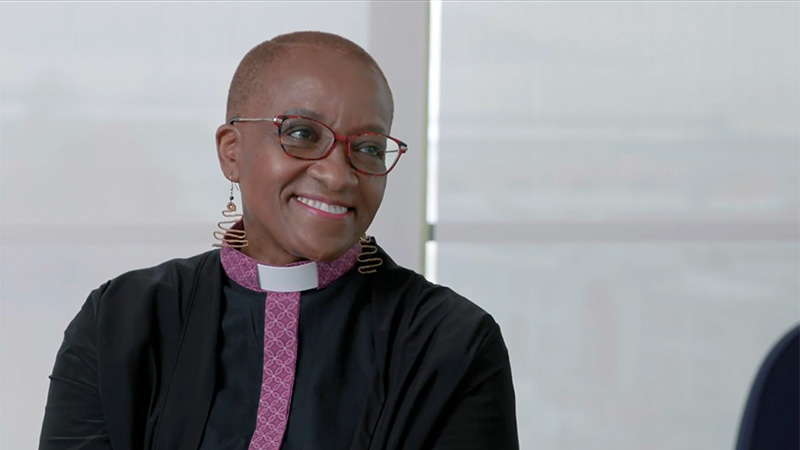Inclusion and Diversity Talks: Reverend Nontombi Naomi Tutu
A conversation around how breaking bias requires acknowledging our own

As a network working for everywhere, everywhere, Visa has elevated our approach to make inclusion and diversity a business imperative. Over the past two years, Visa has been on a mission to promote active learning, dialogue and allyship to our global network.
Our global education series, Inclusion & Diversity Talks welcomes guest speakers for thought-provoking conversations that bring forward intersectional global experiences and points of view, helping us all take action to drive effective change for our people, communities and company.
Reverend Tutu Speaks to Visa Employees
The rise of race-related attacks over the last few years have drawn attention to the ways that bias can become dangerous. But bias can be subtle, too, and something many on the margins experience daily. To kick off Visa’s 2022 Inclusion & Diversity Talks series, Visa welcomed Reverend Nontombi Naomi Tutu, educator and race and gender activist for a candid conversation with EVP, General Counsel and Executive Committee Sponsor of the Visa Women’s Network, Julie Rottenberg. Reverend Tutu shared her thoughts with our global employee base about how racism and sexism present around the world, and ways we can work together to overcome them. Here are some highlights:
“In many ways, [racism and sexism] present the same everywhere: whether I am a Black woman living in apartheid South Africa, or studying in England, or living in this country, there is the same experience of having myself policed in a way that is very different from the way that a white man would experience it,” she said.
But there are ways that bias can show up differently around the world. “In apartheid South Africa, for example, African Americans were classified as honorary white. That made it clear to me that racism is not logical,” she added.
Bias can often manifest itself differently in the workplace, she says, based on different economic levels. For those who succeed in breaking down barriers and moving up the corporate ladder, the Reverend notes, it can feel like they’ve “made it” and are safe in that environment, but perhaps they can easily forget the ways in which they have had to fight. “Therefore, it's an opportunity to pull others along with you.”
But she urges those of privilege to ask themselves: “Do you recognize that you might have privilege, but that privilege actually still costs you as a human being?” Diverse experiences instead can be a “gift,” whether in the workplace or a social setting or on a political stage.
“It is about acknowledging that I come into our conversation, our relationship, my workplace, with particular experiences. Because I am a Black woman, a first-generation immigrant and English is not my first language, so there are all of these things that I bring into any conversation, any relationship, that are gifts,” she added.
Reverend Tutu goes on to talk about an unexpected friendship that questioned her own bias, her personal experience as a global citizen of color, and her hope for the future for women and people of color everywhere.
“I foresee a world where my daughters are safe to walk anywhere at any time dressed anyhow. I foresee a world where when my son leaves and drives from Tennessee to Kentucky, I am not a nervous wreck until I hear that he has arrived,” she said. “I foresee a day where mothers of Black sons will not have that concern. And so each time I speak up, I know that I am speaking up for myself, but I am also speaking up for my grandmothers and for my children and those who are coming after.”
Learn more about Inclusion & Diversity at Visa on Visa.com.